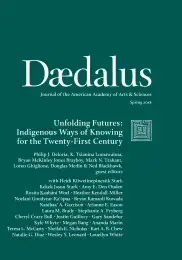If Indigenous Peoples Stand with the Sciences, Will Scientists Stand with Us?
Indigenous sciences are foundationally based in relationships, reciprocity, and responsibilities. These sciences constitute systems of knowledge developed through distinct perspectives on and practices of knowledge creation and decision-making that not only have the right to be pursued on their own terms but may also be vital in solving critical twenty-first-century challenges. “Science” is often treated as if it were a single entity, free of cultural influences and value-neutral in principle. Western science is often seen as instantiating and equivalent to this idealized, yet problematic, view of science. We argue for engagement with multiple perspectives on science in general, and increased engagement with Indigenous sciences in particular. As scholars focused on human learning and development, we share empirical examples of how Indigenous sciences, sometimes in partnership with Western science, have led to new discoveries and insights into human learning and development.
For many years, wildlife biologists who observed coyotes and badgers hunting in the same area hypothesized that they were competing for game and speculated that badgers would follow coyotes in hopes of snatching their prey. After further observation, the biologists realized that badgers and coyotes often hunt cooperatively and that this in fact makes them more successful. The logics in these studies mirrored reasoning patterns within some Indigenous communities: that is, Indigenous peoples often focus on and inquire about reciprocal relationships between entities. It is possible, therefore, that different cultural orientations may facilitate different insights into badger and coyote behavior. To further test this insight and place these findings in a cultural context, we removed all the text from a children’s book on coyote/badger hunting, asked U.S. college students and Indigenous Panamanian Ngöbe adults to look at the book’s illustrations, and listened to what they thought the book depicted. U.S. college students interpreted the story as competitive, while Ngöbe adults saw it as cooperative.1 This study shows that cultural orientations influence how we interpret and explain our observations–both in our everyday lives and when we build systems of knowledge.
Indigenous sciences build knowledge about the world through a distinct set of orienting values, concepts, and questions. These include: What is worthy of attention? What needs explanation? Who is related? How? Why does it matter? Tewa scholar Gregory Cajete has articulated one of the most important concepts of Indigenous science in this way: “everything is related, that is, connected in dynamic, interactive, and mutually reciprocal relationships.”2 This foundational premise shapes Indigenous sciences both in principle and in practice through methods of knowledge building. Cajete goes on:
The ultimate aim [of Native science] is not explaining an objectified universe, but rather learning about and understanding responsibilities and relationships and celebrating those that humans establish with the world. Native science is also about mutual reciprocity, which simply means a give-and-take relationship with the natural world, and which presupposes a responsibility to care for, sustain, and respect the rights of other living things, plants, animals, and place in which one lives.3
As Cajete argues, Indigenous sciences are relationally organized. This has implications for the way humans live and for the responsibilities we carry to each other and to our relatives who make up the rest of nature, including not only plants and animals but also the sun, stars, waters, and land that constitute our ecosystems. This ecological axiom grounds the questions and methods of most Indigenous sciences, fulfilling ethical responsibilities that ultimately contribute to the larger collective good.
In the twenty-first century, climate change will require human communities to adapt and reimagine interdependent relationships with and responsibilities to the natural world and each other. Science will play a critical role in meeting these challenges and developing policy that facilitates the collective good. But what kind of science, and mobilized by whom?
. . .
